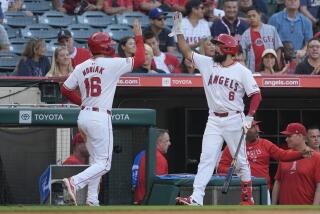Little Ball Makes Gerber a Lot More Important to Angels
- Share via
Little Ball, that bunt-and-run-and-hit-behind-the-runner style of play that helped produce a divisional title for the Angels in 1982, is back in Anaheim.
You know this because of two reasons:
One, the presence of Gene Mauch in the Angel dugout. And two, the presence of Craig Gerber on the Angel roster.
In perhaps any other organization in major league baseball, Gerber would be settling in for another season at the Triple-A level. His professional credentials to date: .267 in Rookie League, .294 in Single-A, .237 in Double-A and .230 last year at Edmonton.
Those aren’t numbers that normally warrant a promotion. OK, kid, here’s the plan--you spend another summer in Canada, you raise that average and we’ll get back to you. Maybe. Like, some time in 1986.
But because Mauch, the author of Little Ball, is back managing the Angels, Gerber’s major league future is now.
Indeed, the scouting report on the 26-year-old Gerber reads like a working definition of Little Ball:
Plays good defense, makes the routine plays.
Doesn’t strike out much, makes decent contact.
Good bunter.
Can steal the occasional base.
Will move the runner over.
Little things count for a lot in Mauch’s style of baseball, and when the Angels went into spring training looking for someone to back up shortstop Dick Schofield, the name Gerber began to mean more to the Angels than just a brand of strained carrots.
“You gotta have two guys (backing up) in the infield,” said Mauch, who already had one utility type in Rob Wilfong. “Gerber’s a bright kid, someone you could put anywhere and have a good feeling that he’d get the job done.
“He can play short, second, third, even the outfield. We put him out there in the spring and he caught everything they hit his way.”
Mauch liked Gerber even more when he saw what the rookie could do with a runner on first base, or in the role of a pinch-runner, or with a sacrifice bunt crying to be laid down.
“Players that have his ability--and I don’t mean to minimize his skills--must execute all the things that can win you a game in the late innings,” Mauch said. “I mean, he’s not going to walk up there and hit a home run for you. If you can’t win a game with a home run, you have to be able to do the little things.
“That’s what I’ve always liked about Wilfong, and that’s what I like about Gerber.”
Gerber concedes that his spot on the Angel roster is partly attributable to being in the right spot at the right time.
“I knew I would get a good look this spring when the Angels went out and didn’t re-sign (reserve infielder Rob) Picciolo,” Gerber said. “I knew they needed someone to back up Dick, someone who could play all the infield positions.
“I kept watching the transactions list during the winter and I saw they didn’t sign anybody. And I knew they didn’t have anybody else in the organization that could fill that role. I figured that if I swung the bat OK during the spring, I’d have a chance.”
Gerber did better than OK. Some off-season fine-tuning, accomplished with the help of hitting coach Moose Stubing, produced an Instructional League batting average of .290 and set in motion Gerber’s spring of arrival. In 14 games, Gerber hit .379--second on the club to only Bobby Grich’s .481.
Surprising? Mauch wouldn’t say so.
“The only surprise,” Mauch said, “is that I don’t know how the hell he hit .230 last year. I think he has a pretty good little stroke, but he told me it was an all-new approach, something he and Moose had just started working on.”
Said Gerber: “Moose changed me around. He knew I’ve never struck out a lot (just 29 in 365 at bats in 1984) and tried to get me to hit the ball on the ground more. If you keep the ball out of the air, some are going to leak through. That can mean as many as 10-15 hits over 140 games.”
By the start of the Freeway Series, Mauch knew that Gerber would be his backup shortstop. “Unless he falls down sick,” Mauch said then, “he’ll be on the team.”
Gerber didn’t get sick but, figuratively, he did fall down during the Freeway Series. He threw away a ball for an error in the first game and forgot to cover third on a bunt play that helped cost the Angels a victory in the third game.
Gerber attributed it to rookie nerves.
“It was scary,” he said. “I had no idea what I was doing. It was a ‘This Is Your Life’ type of thing, playing at Dodger Stadium in front of all your family and friends. But I think I finally got rid of all the butterflies.”
Just wearing a major league uniform had to bring a shock to Gerber’s system. Football was Gerber’s sport in high school, where he threw a school-record 25 touchdown passes for San Bernardino’s Cajon High in 1977. He played baseball in high school but wasn’t drafted until his senior year of college--in the 20th round.
To date, Gerber’s claim to baseball fame was that he was the shortstop who followed Ozzie Smith at Cal Poly San Luis Obispo. A trivia-question answer.
Gerber, an easy-going sort, doesn’t mind that kind of notoriety. “I hope people do know something about me,” he said with a smile. “I want to be remembered for something.”
More to Read
Go beyond the scoreboard
Get the latest on L.A.'s teams in the daily Sports Report newsletter.
You may occasionally receive promotional content from the Los Angeles Times.







